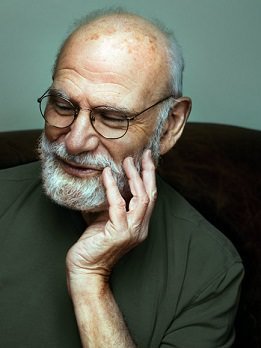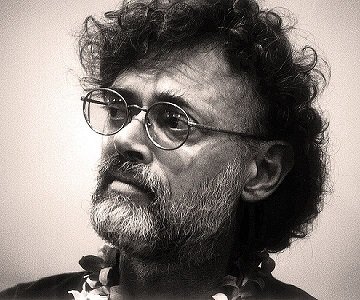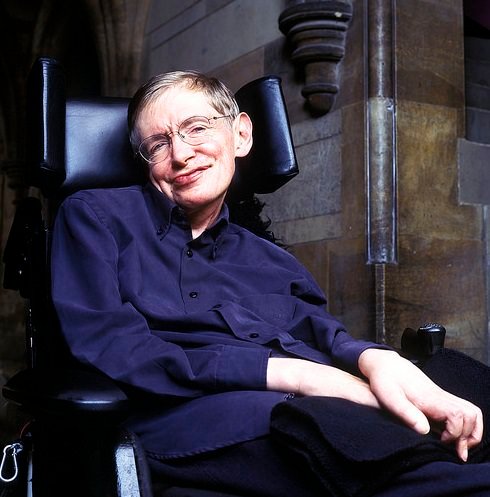
In February 2015, Oliver Sacks (pictured above) announced that he had been diagnosed with terminal cancer of the liver, and had only months to live. When reading his beautiful and moving article ‘My Own Life’ in the New York Times, it struck me how much humility and passion for life he exuded, despite his awareness of how little time he had left. He was not bitter or angry, or wallowing in the unfairness of his situation. Although he acknowledged his own fear, he was still able to remain calm and collected and express his gratitude for the opportunities that life had given him. He notes, “Over the last few days, I have been able to see my life as from a great altitude, as a sort of landscape, and with a deepening sense of the connection of all its parts.”
"I cannot pretend I am without fear. But my predominant feeling is one of gratitude. I have loved and been loved; I have been given much and I have given something in return; I have read and traveled and thought and written. I have had an intercourse with the world, the special intercourse of writers and readers. Above all, I have been a sentient being, a thinking animal, on this beautiful planet, and that in itself has been an enormous privilege and adventure."
His article inspired me to embark on a quest to gather some of the insights and reflections shared by those who have also been faced with their own imminent deaths, to see what we can learn from them about living our lives. The common themes that repeatedly come across are an appreciation and gratitude for all they have been privileged to experience, and a startling level of honesty and pragmatism.
It is powerful to see how facing up to the existential reality of our own mortality, something we frequently avoid or distract ourselves from, can actually empower us with a sense of purpose, urgency and a more passionate engagement with life itself.
Steve Jobs

In 2005, Steve Jobs gave an inspirational commencement address at Stanford University, in which he described learning of his pancreatic cancer diagnosis and the impact this had on his life from that point onward.
“Remembering that I'll be dead soon is the most important tool I've ever encountered to help me make the big choices in life. Because almost everything — all external expectations, all pride, all fear of embarrassment or failure - these things just fall away in the face of death, leaving only what is truly important. Remembering that you are going to die is the best way I know to avoid the trap of thinking you have something to lose. You are already naked. There is no reason not to follow your heart."
"No one wants to die. Even people who want to go to heaven don't want to die to get there. And yet, death is the destination we all share. No one has ever escaped it, and that is how it should be, because death is very likely the single best invention of life. It's life's change agent. It clears out the old to make way for the new. Right now the new is you, but someday not too long from now, you will gradually become the old and be cleared away. Sorry to be so dramatic, but it is quite true.
Your time is limited, so don't waste it living someone else's life. Don't be trapped by dogma — which is living with the results of other people's thinking. Don't let the noise of others' opinions drown out your own inner voice. And most important, have the courage to follow your heart and intuition. They somehow already know what you truly want to become. Everything else is secondary."
Carl Sagan

Although not a quotation from Sagan himself, this short piece from his wife Ann Druyan expresses his perspective on death and his appreciation for the time he had left with her. Sagan died tragically early at only 62, dying of pneumonia after receiving three bone marrow transplants to try and combat his illness.
“When my husband died, because he was so famous and known for not being a believer, many people would come up to me — it still sometimes happens — and ask me if Carl changed at the end and converted to a belief in an afterlife. They also frequently ask me if I think I will see him again. Carl faced his death with unflagging courage and never sought refuge in illusions. The tragedy was that we knew we would never see each other again. I don’t ever expect to be reunited with Carl. But, the great thing is that when we were together, for nearly twenty years, we lived with a vivid appreciation of how brief and precious life is. We never trivialized the meaning of death by pretending it was anything other than a final parting.
Every single moment that we were alive and we were together was miraculous — not miraculous in the sense of inexplicable or supernatural. We knew we were beneficiaries of chance… That pure chance could be so generous and so kind… That we could find each other, as Carl wrote so beautifully in Cosmos, you know, in the vastness of space and the immensity of time… That we could be together for twenty years. That is something which sustains me and it’s much more meaningful…
The way he treated me and the way I treated him, the way we took care of each other and our family, while he lived. That is so much more important than the idea I will see him someday. I don’t think I’ll ever see Carl again. But I saw him. We saw each other. We found each other in the cosmos, and that was wonderful."
Terence McKenna

In 1999, McKenna was diagnosed with a highly aggressive form of brain cancer, following a series of seizures at his home in Hawaii. He described them as the most powerful psychedelic experiences he had ever known, and had an incredibly positive outlook on his own passing.
“I always thought death would come on the freeway in a few horrifying moments, so you'd have no time to sort it out. Having months and months to look at it and think about it and talk to people and hear what they have to say, it's a kind of blessing. It's certainly an opportunity to grow up and get a grip and sort it all out. Just being told by an unsmiling guy in a white coat that you're going to be dead in four months definitely turns on the lights. ... It makes life rich and poignant. When it first happened, and I got these diagnoses, I could see the light of eternity, a la William Blake, shining through every leaf. I mean, a bug walking across the ground moved me to tears."
Epicurus

Epicurus was an ancient Greek philosopher, who died in the year 270 BC. He believed that death was not something to be feared, and famously said that "Death is nothing to us, as when we exist, death is not; and when death exists, we are not." This doctrine led to the famous Epicurean epitaph: Non fui, fui, non sum, non curo ("I was not, I was, I am not, I do not care"), which is often used today at humanist funerals and is inscribed on many gravestones.
Epicurus suffered from kidney stones, and died at the age of 72. Despite the prolonged pain he suffered, he wrote the following in a letter to a friend, showing that he did indeed live by his philosophy, and found joy in life until the very end.
"I have written this letter to you on a happy day to me, which is also the last day of my life. For I have been attacked by a painful inability to urinate, and also dysentery, so violent that nothing can be added to the violence of my sufferings. But the cheerfulness of my mind, which comes from the recollection of all my philosophical contemplation, counterbalances all these afflictions."
Stephen Hawking

Although still very much alive, Stephen Hawking was diagnosed with motor neurone disease at 21, an illness that was was expected to kill him within only a few years. Against all odds, the progression of his disease slowed down and he has now surpassed 75 years of age and shows no signs of stopping. Recently he shared his reflections on death:
"I have lived with the prospect of an early death for the last 49 years. I'm not afraid of death, but I'm in no hurry to die. I have so much I want to do first. I regard the brain as a computer which will stop working when its components fail. There is no heaven or afterlife for broken down computers; that is a fairy story for people afraid of the dark."
Thanks for reading
I will be continuing to publish similar content in the upcoming weeks, so be sure to follow if you'd like more posts about philosophy, cosmology and consciousness. This post was also published on Medium, and any future content I create will be posted on both platforms. If you want to follow me elsewhere you can find me at:
Twitter - @ongoingwow
Medium - @ongoingwow
Instagram - @ongoingwow
As a funeral director I have come to terms with the fact that we all will die. It is one of the reasons I left the industry. It put into perspective what mattered most to me... My family and doing all I can to advance science and bring it to the masses. Great Article and remember to live because we all will die.
Thanks for commenting - I’d be interested to learn more about how your work as a funeral director has influenced your perspective on death. How do you feel about the work of Aubrey de Grey and his mission to end/cure aging?
I have never heard of Grey but I am interested in his work. I believe that the next advancement in medicine is going to come in my lifetime and double or triple the average life expectancy.
Here’s hoping! What arena do you think this breakthrough will be within, something like gene therapy?
I found a video of Aubrey de Grey speaking at TedX that you might enjoy called “How we can finally win the fight against aging” -
I might write a whole post on this topic actually, you’ve inspired me!
This was worth all 18 minutes of it! I thought it was going to be another one of those telomere talks which I think "popsci" puts too much emphasis on. I would be interested in a post on aging. I think two things that would be interesting to study in regards to aging are hormone changes and gut bacteria. I am not saying there is a difference in gut bacteria or even that it has any implications on the aging process but it would be interesting to study.
Glad you enjoyed it - there’s a documentary featuring him called The Immortalists that I really enjoyed too :)